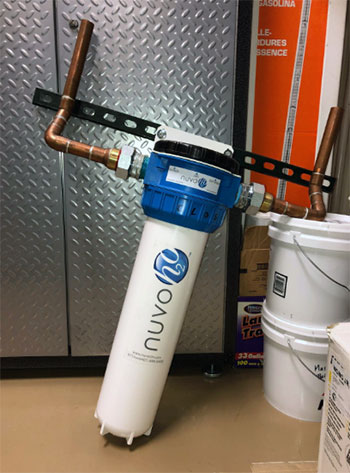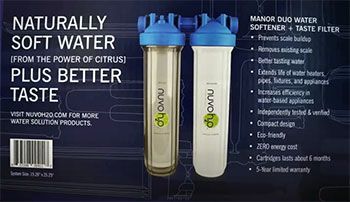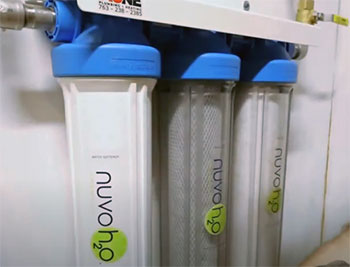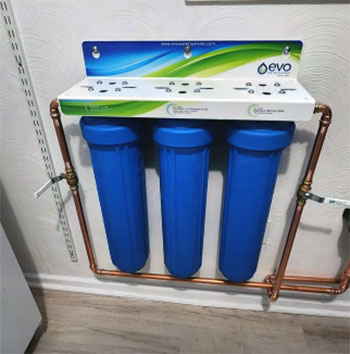I’m thrilled to share my journey with a citrus water softener, a game-changer for tackling hard water in my home.
If you’re tired of scale buildup on your faucets, dry skin after showers, or appliances wearing out too soon, this product is worth your attention.
Unlike traditional salt-based systems, citrus water softeners use citric acid to condition water, offering an eco-friendly, low-maintenance alternative that doesn’t compromise on results.
I’ve been using one for months, and the difference is noticeable—shinier hair, softer clothes, and no harsh chemicals. Trust me, you’ll want to keep reading to see why this is a smart buy.
My Experience With Citrus Water Softener
When I first moved into my home in a hard-water area, I noticed the telltale signs almost immediately. My faucets had crusty white buildup, my skin felt tight and itchy after showers, and my dishwasher seemed to be working overtime just to get glasses half-clean.
I’d heard about water softeners before, but the idea of lugging heavy salt bags or dealing with wastewater didn’t appeal to me.
That’s when I stumbled across citrus water softeners, specifically the NuvoH2O Home System, which uses citric acid to condition water instead of removing minerals like traditional systems. I was skeptical but intrigued by its eco-friendly promise, so I decided to give it a shot.

Installing the system was surprisingly straightforward.
I’m no plumber, but with the clear instructions provided, I had it set up in a couple of hours. The compact design was a big plus—
it tucked neatly into my utility room without eating up space.
Once it was running, I noticed changes within days. My hair, which used to feel straw-like after washing, became softer and shinier.
My laundry came out noticeably fluffier, and I wasn’t scrubbing scale off my showerhead every other week.
The water tasted clean, with no odd aftertaste, which was a relief since I’d read mixed reviews about other systems altering flavor.
What really sold me was how low-maintenance it felt compared to what I’d heard about salt-based softeners. No heavy bags to haul, no drain line to install, and no electricity needed. I just swapped out the citric acid cartridge every few months, and that was it.
Sure, it wasn’t perfect—my water still tested “hard” on a strip, meaning it doesn’t technically soften water but conditions it to prevent scale. But in practical terms, it solved my biggest gripes. My appliances were happier, my skin wasn’t screaming for lotion, and I felt good knowing I wasn’t dumping sodium into the environment. After six months, I’m a convert, but I’ll break down the pros and cons to give you the full picture.
Read More: My Thoughts On Flagship Water Filtration System
Pros Of Citrus Water Softener
- Eco-friendly operation: This system doesn’t use salt or produce wastewater, which means you’re not adding sodium to your local sewage system or harming the environment. It’s a guilt-free way to tackle hard water, especially if you’re in an area with water softener bans.
- Low maintenance needs: You only need to replace the citric acid cartridge every few months, depending on your water usage. It’s a quick swap that doesn’t require tools or expertise, saving you time and hassle compared to traditional systems that need constant salt refills.
- Compact and easy to install: The unit is small enough to fit in tight spaces, and installation is DIY-friendly for most. I had mine up and running without a plumber, which kept costs down and made the process stress-free.
- Safe for drinking and plants: Unlike salt-based softeners that add sodium, this system keeps water safe for you, your pets, and your garden. I noticed no change in taste, and my houseplants are thriving.
- Protects appliances and plumbing: By conditioning water to prevent scale buildup, it extends the life of your dishwasher, washing machine, and pipes. I’ve seen less gunk in my fixtures, which means fewer repairs down the line.
- No electricity required: It runs without power, which is a win for your utility bill and the planet. This was a big selling point for me, as I didn’t want another device jacking up my energy costs.
These benefits make the citrus water softener a practical choice for anyone looking to simplify their water treatment while keeping things green. It’s not just about softer water—it’s about a smarter, more sustainable way to manage your home’s water quality. I’ve been impressed by how seamlessly it fits into my routine, and the lack of environmental impact feels like a bonus every time I use it.
Cons Of Citrus Water Softener

- Limited effectiveness in very hard water: If your water hardness exceeds 25 grains per gallon, this system might struggle. I live in an area with moderate hardness, so it worked well, but friends with extremely hard water reported less impressive results.
- Cartridge replacement costs add up: While maintenance is easy, the citric acid cartridges aren’t cheap. Depending on your water usage, you might spend $100–$150 a year, which can feel steep if you’re on a tight budget.
- Doesn’t truly soften water: Technically, it conditions water rather than removing calcium and magnesium. If you’re expecting water that tests “soft” on a hardness strip, you’ll be disappointed, though I didn’t find this a dealbreaker for daily use.
- Potential for copper pipe corrosion: High concentrations of citric acid could, over time, corrode copper pipes. I haven’t noticed issues in my home, but it’s something to monitor if you have older plumbing.
- Mixed results for some users: Online reviews mention inconsistent performance, with some users seeing no difference in scale or water feel. My experience was positive, but it seems to depend on your water chemistry and expectations.
- Not ideal for large households: If you have a big family or heavy water usage, you’ll need to replace cartridges more often, which can get pricey and annoying. Smaller homes like mine fare better with this system.
These drawbacks don’t outweigh the benefits for me, but they’re worth considering based on your home’s needs. It’s not a one-size-fits-all solution, so testing your water hardness and weighing costs upfront is key.
Maintenance Tips For Citrus Water Softener

- Check cartridge replacement schedule: Most systems, like the NuvoH2O, recommend swapping the citric acid cartridge every 3–6 months, depending on water usage. I set a calendar reminder to check mine quarterly, which keeps things running smoothly without surprise clogs or reduced performance.
- Monitor water quality regularly: Use a water hardness test kit every few months to ensure the system is still conditioning effectively. I noticed a slight uptick in scale when my cartridge was nearing its end, so testing helps you stay proactive.
- Inspect plumbing for corrosion: Since citric acid can potentially affect copper pipes, I check my plumbing annually for signs of wear. A quick look at exposed pipes or a call to a plumber can catch issues early, though I’ve had no problems so far.
- Clean fixtures to maintain results: Even with the softener, some buildup can occur over time. I clean my faucets and showerheads with vinegar monthly to keep them sparkling, which complements the system’s work.
- Store cartridges properly: Keep spare cartridges in a cool, dry place to preserve their effectiveness. I learned the hard way that a damp garage can degrade them, so I now store mine indoors.
- Follow manufacturer guidelines: Stick to the brand’s instructions for installation and maintenance. I skipped a step once and had a small leak, but following the manual to the letter has kept my system hassle-free since.
Maintaining a citrus water softener is straightforward, but staying consistent with these steps ensures you get the most out of it. I’ve found that a little attention goes a long way in keeping my water quality high and my home free of scale.
Comparison With Other Brands

SpringWell Futuresoft
SpringWell’s Futuresoft uses template-assisted crystallization (TAC), which conditions water by altering mineral structures to prevent scale. I found it more effective than citric acid in very hard water, with studies showing up to 99.6% scale prevention. It’s pricier—around $1,450 upfront—but the TAC media lasts years, reducing long-term costs. Unlike my citrus system, it requires a pre-filter, which adds to maintenance but improves performance. The Futuresoft doesn’t need electricity or produce wastewater, making it eco-friendly, but its larger tank might not suit small spaces like my utility room.
Kind E-2000
The Kind E-2000 also uses TAC but in a cartridge-based system, similar to my NuvoH2O. It’s more affordable at around $700 and includes an optional carbon filter for better-tasting water, which I wish my system had. Installation is a breeze, and its 15-gallon-per-minute flow rate suits larger homes better than my citrus softener. However, like mine, it struggles with extremely hard water, and cartridge replacements can get costly over time. I’d pick this for its filtration perks but stick with citric acid for simplicity.
Culligan Salt-Free Conditioner
Culligan’s salt-free conditioner uses a proprietary media, not citric acid, and focuses on conditioning rather than softening. It’s durable, lasting 10–20 years with proper care, but it’s more expensive and requires professional installation, unlike my DIY-friendly NuvoH2O. I found Culligan’s system less versatile for small households, as it’s designed for higher water demands. It’s a solid choice if you want longevity and don’t mind the upfront cost, but I prefer the citrus system’s affordability and ease.
Yarna Capacitive Electronic Descaler
The Yarna system takes a completely different approach, using electromagnetic waves to condition water without media or cartridges. It’s budget-friendly at under $300 and maintenance-free, which is tempting compared to my cartridge swaps. However, research from Penn State and Purdue questions its effectiveness, and I noticed mixed user reviews online. My citrus softener delivers more consistent results, but Yarna’s non-invasive setup might appeal if you’re wary of plumbing changes.
Each brand has its strengths, but my citrus water softener strikes a balance of affordability, ease, and eco-friendliness that works for my home. Your choice depends on water hardness, budget, and maintenance preferences.
Read More: My Thoughts On Waterboss Proplus 380
Frequently Asked Questions (FAQ)
Yes, they work by conditioning water to prevent scale buildup, but they don’t remove minerals like salt-based systems. My experience shows softer hair, cleaner fixtures, and happier appliances, though effectiveness varies with water hardness. In areas with moderate hardness, like mine, they’re great, but very hard water (above 25 grains per gallon) may need a stronger solution. Research, like a Penn State study, notes mixed results for citric acid systems, so test your water first.
It depends on your needs. I love my NuvoH2O for its simplicity and eco-friendly citric acid approach, ideal for small households. SpringWell’s Futuresoft excels in high-hardness areas with TAC technology, while Kind E-2000 offers filtration perks. Culligan’s durability suits larger homes, and Yarna’s descaler is a low-cost, no-maintenance option. For my lifestyle, NuvoH2O hits the sweet spot, but SpringWell might edge out for tougher water conditions.
Technically, no—it conditions water. Citric acid, like in my NuvoH2O, binds to calcium and magnesium to prevent scale without removing them. Your water will still test “hard,” but you’ll notice less buildup and softer skin. It’s not as thorough as ion exchange but avoids sodium and wastewater, which I appreciate. Studies, like one from Penn State, question its efficacy compared to TAC, but I’ve found it effective for my moderate-hardness water.
Yes, water from citrus softeners is safe to drink daily. Unlike salt-based systems that add sodium, my NuvoH2O uses citric acid, which doesn’t alter water’s safety for humans, pets, or plants. I’ve noticed no taste changes, and my family drinks it without issue. Just ensure your system is maintained to avoid any buildup affecting water quality. If you have specific health concerns, check with a doctor, but I’ve had no problems.
Conclusion: For Citrus Water Softener
If hard water is wreaking havoc in your home, a citrus water softener is a fantastic choice. It’s eco-friendly, easy to maintain, and delivers noticeable results—think shinier hair, cleaner fixtures, and happier appliances. My experience with the NuvoH2O has been a game-changer, and I love its simplicity and green approach. While it’s not perfect for every situation, it’s a smart, sustainable investment for most households. Don’t let scale win—grab a citrus water softener and enjoy the difference. You won’t regret it!
